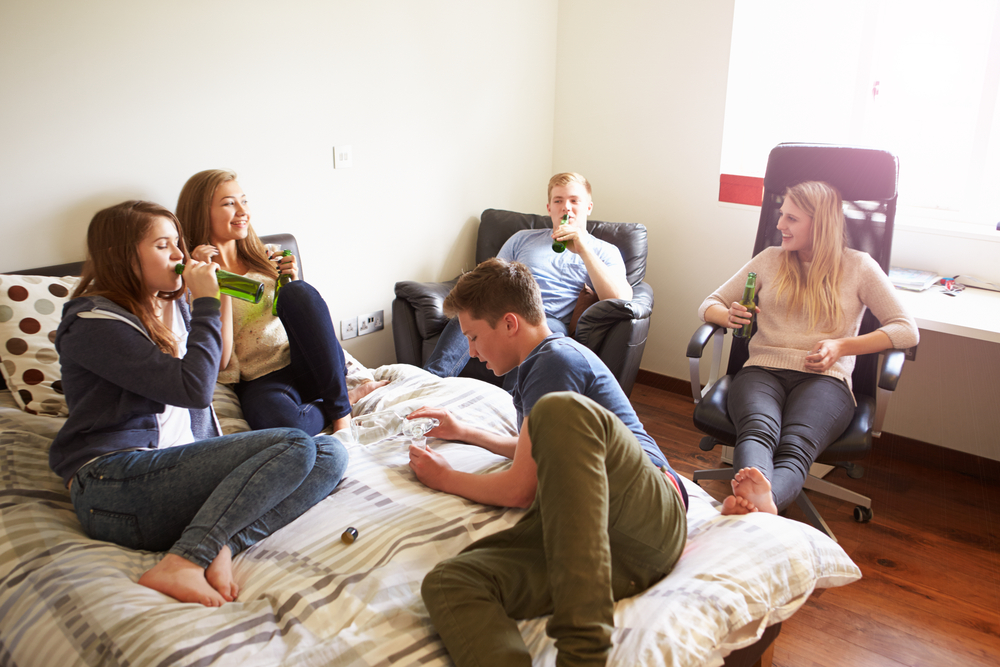Blackouts Common Among Teen Drinkers, Study Finds

Almost every teen who drinks alcohol has had at least one blackout, and many report having them regularly, a new study from the United Kingdom shows.
Just 5 percent of the study participants — who were surveyed about their drinking habits from ages 15 to 19 — said they'd never had an alcohol-related blackout, Dr. Marc Schuckit of the University of California, San Diego, in La Jolla, and his colleagues found. They report their findings in Alcoholism: Clinical and Experimental Research.
"A lot of kids are doing this somewhat regularly, they're doing it repeatedly," Schuckit said. While the study was conducted among British teens, who tend to start drinking younger and to drink more heavily than their U.S. peers, findings among American teens would likely be similar, he added.
Although many drinkers see alcohol-related blackouts as a source of amusement, they're no laughing matter, Schuckit said. "You are almost certainly so drunk that you are doing things that you wouldn't do if you weren't drunk."
Schuckit and his team looked at data from the Avon Longitudinal Study of Parents and Children, an ongoing study of 8,000 children born in the early 1990s. In the new study, the researchers looked at data from 1,402 adolescents who reported drinking alcohol. They were surveyed about their drinking at age 15, age 19 and on two other occasions in between.
The researchers found that 30 percent of the study participants reported having blackouts at age 15 and 74 percent said the same at age 19. [7 Ways Alcohol Affects Your Health]
The researchers also identified four "trajectories" of alcohol blackouts, or paths that teens seemed to be on over time, in terms of their blackouts. For 44.9 percent of teens, the number of their blackouts slowly increased with age, whereas for 29.5 percent, the number of blackouts they experienced increased quickly as the teens got older. Another 20.5 percent of teens reported having blackouts consistently at all time points. Just 5.1 percent had no blackouts at any time point.
Get the world’s most fascinating discoveries delivered straight to your inbox.
The teens who had a rapid increase in the number of blackouts were more likely to be female, to drink more, to smoke cigarettes and to hang out with peers who also reported substance use. Teens in this group were also more likely to exhibit "externalizing behaviors," such as impulsivity and aggression.
"Parents and physicians need to know that [blackouts] are important to look for, and that each time that happens it's a real danger sign of something that could have happened that night," Schuckit said.
"Blackouts are actually not a joke, they represent a serious neurological event that needs to be taken seriously," said Scott Swartzwelder, a professor of psychiatry at Duke University Medical Center and a senior research career scientist at the U.S. Department of Veterans Affairs. Swartzwelder studies adolescent drug and alcohol use, but did not participate in Schuckit's research.
Swartzwelder said he expects that blackouts are just as common among teen drinkers in the United States as they are in the United Kingdom — if not more so.
What's particularly concerning about blackouts in teens is that these events could be more damaging to the adolescent brain than they are to the adult brain, Swartzwelder said.
"More and more, we're finding that both in the animal models and in the clinical literature, that it does look like if you give an adolescent a certain amount of alcohol repeatedly over a certain amount of time, and you give a parallel treatment to an adult for a comparable period of time, the adolescent will have suffered more long-term negative effects than the adult," he said.
It's not exactly clear why that is, but it may involve the maturation of the brain in the structures that are involved in memory, he said. "It seems pretty clear now that adolescence does represent a period of distinct vulnerability to some of the long-term negative effects that alcohol has."
And teens who report an escalating number of blackouts are clearly escalating their drinking over time as well, which greatly increases their risk of becoming addicted to alcohol, Swartzwelder said.
"It's just really important to do anything that we can to try to identify at-risk populations for alcohol addiction," and looking at a teen's pattern of blackouts seems to be a pretty good measure of that, he said.
To convince young people of the harmfulness of blackouts, Swartzwelder said, he will often tell them that in order to shut down the brain's encoding of memory for a couple of hours — as happens in an alcohol-related blackout — it would be necessary to hit someone in the head hard enough to render them unconscious for at least five minutes. "When young people do think about that analogy between head injuries and drinking, that often takes them by surprise," he said. "Invariably, kids will come up to me and go, 'man, I didn't know that, why didn't anyone tell me before?'"
Follow Live Science @livescience, Facebook & Google+. Original article on Live Science.


